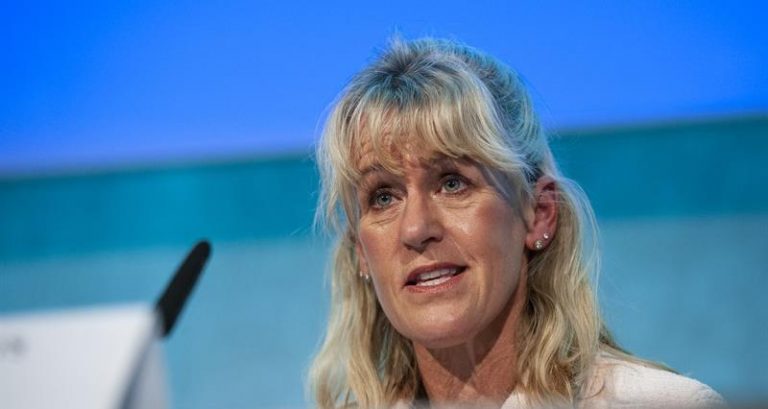Groceries Code Adjudicator calls on suppliers to share experiences of retailer relationships
The Groceries Code Adjudicator has launched its 2023 annual survey to gather key information on supplier relationships with retailers.
Launched yesterday, the online survey will be open for six weeks until 26 February. With record levels of inflation, the war in Ukraine and extreme weather events, the past year has been particularly challenging for UK farmers and growers, putting additional strain on some supply chain relationships.
The survey is a valuable opportunity for suppliers to tell the Groceries Code Adjudicator about any issues they are facing, and whether retailers are treating them fairly and lawfully.
This is the tenth year the survey has been conducted and Adjudicator Mark White is urging suppliers to continue their support for the annual survey by submitting their responses.
He said: “Information gathered from farmer and grower feedback is vital to highlight current issues the grocery sector is facing. The data will influence and shape the GCA’s future work and priorities for the upcoming year.
“For example, in last year’s survey a quarter of suppliers highlighted issues with retailer responses to cost price increase requests, making this the most raised issue in the last five years.
“As a result, the GCA has focused his priorities on CPI requests, and at the start of the year launched the seven golden ruleswhich highlight how retailers should treat suppliers when processing requests.
“This survey is one of the most important ways for suppliers to confidentially tell me about their experiences with the retailers. I want to hear from as many suppliers as possible so I can understand the ongoing impact of inflation and other issues affecting suppliers.”
YouGov will be conducting the survey for the GCA and all information provided will be treated in strict confidence. Respondents are not identified to the GCA without having given their consent, and are never identified to retailers.
Complete the 2023 GCA annual survey here.
More needs to be done to fill UK’s million-plus job vacancies, says BCC
New figures about the UK’s labour market come as no surprise to business or the British Chambers of Commerce as the fight goes on to get people into job vacancies, says the organisation.
Jane Gratton, Head of People Policy at the BCC, says the labour market remains tight, with the consequence that if firms can’t hire the staff to fulfil their order books, any room for growth is extremely limited.
She said Government was heading in the right direction with its plans to help bring economically inactive workers back into the labour force, especially older workers who left in their droves when lockdown ended – but that wasn’t enough.
“But we need to see more action. There must be carefully tailored careers advice, job seeker support and rapid re-training opportunities to help employers harness the skills and experience of older workers.
“Businesses also need to play their part, by engaging with local skills and employment opportunities, adopting flexible working policies where possible and helping older workers develop their skills for the changing workforce.
“Finally, Government must hear our calls to urgently reform the Shortage Occupation List to help businesses fill urgent job vacancies when they cannot recruit locally. The List should include job roles below RQF Level 3 for sectors where there is clear evidence of a national shortage.
“The UK’s tight labour market is one of the top challenges preventing our businesses and economy from growing. It’s no use simply talking about growth if we are not prepared to take action on it.
“With an anaemic economy and low productivity, Government must take immediate steps to ease the considerable labour pressures on businesses – we can’t afford to wait any longer.”
Name change for Doncaster law firm after acquisition
Doncaster-based Atherton Godfrey LLP has formally changed its name, as it becomes fully integrated with the Switalskis group following an acquisition in 2021.
Atherton Godfrey was acquired by the Yorkshire law firm two years ago in January, a move that took it into the Top 150 UK law firms.
As part of the Switalskis group, its team also benefits from being part of a wider group with additional offices, expertise, connections and resources throughout the Yorkshire region and also in London.
Sarah Naylor, Director at Switalskis Solicitors, says: “We took the decision to join the Switalskis group with a long-term aim of moving towards full integration on behalf of the firm for commercial reasons. We wanted to come under the umbrella of a larger practice to ensure that our teams could continue to offer an excellent service. The most significant change is that we now have access to a much larger team of experienced legal professionals.
“Integrating the firm with Switalskis has been a very carefully planned process, with the best interests of all our clients of paramount consideration throughout, and it has now culminated after two years in the switch from Atherton Godfrey to Switalskis Solicitors on the 1st December 2022.”
Dales dairy gets grant to move milk for Wensleydale cheese making
Leyburn-based Curlew Dairy has been given £1,000 from the Small Business Grant scheme to help buy a milk trailer to transport the raw product from farm to dairy.
Based in a converted garage, the dairy turns raw milk into Wensleydale cheese – the Old Roan is created by hand in small batches and then sold locally. But to expand owner Samantha Spence needed a trailer capable of carrying 1,000 litres of milk to them daily – moving away from the borrowed equipment they had been using.
Shew said: “We began making cheese in our micro dairy early last year using unpasteurised milk from a local dairy farm. Sales went really well and we quickly realised we needed to make larger batches. The grant allowed us to buy a milk trailer to transport larger quantities of milk from the farm to the dairy.
“Making our process more efficient allowed us to really focus on the cheese recipe and just before Christmas we became stocked at Neal’s Yard Dairy and Paxton & Whitfield in London – two of the best artisan cheese shops in the country. We wouldn’t have achieved this without the support we received.”
The Small Business Grant scheme offers up to £1,000 to small businesses under 36 months old to help start and grow. The fund can be used towards the purchase of equipment, marketing costs and adaptation to premises.
BHP appoints new Director of People
BHP has enhanced its HR team with the appointment of Karen Arch as Director of People.
Karen joins BHP after two and a half years as Group Head of HR at a financial adviser support group in Leeds.
With extensive HR experience across a range of industries including technology, financial, retail, property and manufacturing, Karen is now taking on an important new role in BHP’s HR team. She will continue to develop BHP’s industry-leading employee support plan, which has led the firm to be voted into the Sunday Times Top 100 Best Companies to Work For.
Karen will primarily be based in Leeds but will work across the firm’s offices in Sheffield, Chesterfield, Cleckheaton and York. She said: “I’m thrilled to be joining BHP. There’s an excellent team here and it’s a great opportunity for me to work directly with people with a focus on attracting and retaining talent, which is something I love doing.
“BHP is forward thinking, and I was attracted by the prospect of being able to build further on the great things that the firm is already doing. There is clearly a well-established support structure in place, and I am keen to enhance and shape, rather than revolutionise, the valuable work that has been done so far.
“I’ve been impressed by the passion and energy in everyone I’ve met and I’m keen to start collaborating with the team over the coming months.”
Lisa Leighton, Joint Managing Partner at BHP, said: “As a firm, we always endeavour to do our best for our people, and we place the utmost importance on looking after our team.
“I’m delighted that Karen has joined us and it’s great to see that she shares the mindset of the management team in terms of being people focused and creating a workplace where people want to stay. Karen’s experience will be invaluable as we continue to develop the support that we provide for our employees.”
Louise Allen, Head of HR at BHP, said: “We’re excited to have Karen on board. Her extensive HR knowledge across a range of sectors will undoubtedly prove to be a huge asset for BHP moving forward. Karen’s appointment will bring new ideas and a fresh outlook to our team.”
York-based Rolawn secures fourth year running environmental accreditation
Market-leading turf and topsoil producer, Rolawn Limited, has achieved continued accreditation under the Green Achiever scheme for the fourth consecutive year. Achieving the Diamond Banner Award, Rolawn secured the highest level in the scheme.
Rolawn, based in the Vale of York, has secured the status under the Green Achiever scheme which offers environmental accreditation to businesses wishing to obtain independent acknowledgement of their green credentials and verification that they are actively reducing their environmental impact.
Ken Brewster, Rolawn’s Marketing Director, said: “We have a robust and proactive environmental strategy, not all of which is necessarily visible to our audience, so the continuation of this accreditation is really valuable in helping us to reassure our customers that we take this seriously.
“Integrity is important to us at Rolawn and that includes implementing improvements that aren’t overtly obvious, yet still make a real difference, for example the installation of onsite solar panels which has made a significant contribution to production.”
To achieve Diamond Banner Award status, Rolawn had to evidence proactivity on a range of levels from day to day, ground level operations, such as energy consumption and recycling, right through to higher level operational compliance with complex environmental legislation.
New Skegness hotel gets green light
Plans for a new hotel in Skegness have been approved by East Lindsey District Council.
Burney Property Group are behind the proposals for the former Crazy Golf site on South Parade, which has been left vacant for the past four years.
The new scheme involves two units on the site; a six storey Travelodge hotel with 80 rooms, and a drive thru Starbucks restaurant.
A design statement indicates that the development would create a significant number of local job opportunities, and have knock on beneficial impacts associated with the wider regeneration and investment in the local area.
EV charging points would be included in the development, along with cycle parking spaces, 65 car parking spaces for the hotel and 17 spaces for the Starbucks unit.
A publicly accessible food and drink outlet is also proposed on the hotel’s fifth floor, with panoramic views across Skegness beach and coastline.
Former Notts County owner sets sights on Scunthorpe
Alan Hardy, the former owner of Notts County, is said to be leading a consortium interested in purchasing Scunthorpe United.
The reports from BBC Radio Humberside come after the football club was handed a winding-up petition over money owed to HMRC.
A sale by current owner Peter Swann looked close at the end of 2022, with a deal agreed for the acquisition of Scunthorpe United by a local group.
At the start of December it was said the National League club would work with the group during the final due diligence and transition into their ownership “over the coming weeks.”
Hardy took over at Notts County in 2017, selling to Christoffer and Alexander Reedtz, the owners of football statistics firm Football Radar, in 2019, following the club’s relegation to the National League.
Former top rugby league referee joins CBRE’s Development Advisory team
James Child, a former top English rugby league referee, has been hired by real estate advisor CBRE as associate director in the Development Advisory team. James will be based in Leeds, but will work across the north of England.
James combined his extensive 12-year role as an elite rugby league match official with his profession as a chartered surveyor. He brings almost 20 years’ experience in the property industry, predominantly as principal land and property officer with Leeds City Council, where he brought his general practice skills to the fore through his involvement in multiple acquisitions and disposals across the city, including land assembly, development agreements and joint ventures.
James has been influential in the progression of high profile projects across Leeds, including the Arena Quarter and Temple District forming part of the South Bank Quarter.
James joins CBRE’s senior director, Catherine Birks to bolster and grow the Development Advisory team across the north, with particular focus on Yorkshire, the North East and East Midlands. Both bring a wealth of direct experience, passion and knowledge to support and advise clients on complex property and regeneration projects which require collaboration between public and private sectors.
CBRE’s Development Advisory team has a strong track record across multiple sectors, advising on complex regeneration projects at all stages from options appraisals and master planning through to complex land assembly, funding, disposal and delivery strategy implementation.
Catherine Birks, senior director, CBRE Development Advisory team, said: “We are delighted to bring James on board to support our growth strategy for the Development Advisory team across the North. James is a fantastic addition to CBRE, bringing an invaluable breadth of experience, knowledge and a strong skillset across the regeneration and economic development sector.
“His appointment demonstrates CBRE’s continued expansion of Development Advisory services across the north, further boosting our offer and expertise to assist clients in successfully delivering complex development projects.”
James Child added: “I am excited to be joining such a highly regarded international real estate advisory firm in CBRE having recently retired from officiating at the highest level of professional rugby league.
“I’ll be building on the success of the established team, providing expert tailored advice to clients, and promoting the capability of the wider CBRE business in the strategic regeneration and development sector.
“With my largely public sector background in acquisition and disposal, options appraisal and delivery of economic regeneration through development, I am looking forward to assisting clients across the region to unlock and deliver complex schemes to achieve their development, regeneration and economic growth ambitions.”
Yorkshire council puts up more money to help firms employ apprentices
A scheme that helps Richmondshire businesses employ apprentices has received another £15,000 in funding from district councillors.
Members of the authority’s Corporate Board have given the green light to the cash award which will mean more small businesses can access help – and they can also use the grant to train apprentices to a higher level.
said Council Leader, Councillor Angie Dale: “We want to encourage economic growth while at the same time develop home grown talent and retain young, ambitious people who would otherwise have to leave the area to find skilled work.
“Since its launch in 2019 our apprenticeship scheme has awarded £100,000 to help 81 people secure places. With this extra £15,000 we can add even more to that number and leave a lasting legacy for the district’s young people.”
She said apprentices have been employed in everything from hairdressing, carpentry, sales and hospitality to digital marketing and vehicle repairs. The scheme has two elements – £2,000 is available for businesses taking on a level one to three apprentice and £3,000 for those offering a level four plus apprentice.
Sheffield shipping container scheme to be dismantled
The containers on Sheffield’s Fargate, hosting shops, bars and restaurants, are set to be dismantled from Monday, January 30 after being beleaguered with controversy over cost and delays in their initial opening.
The Council says businesses currently operating inside have been informed of its intentions to close the container complex by the end of the month.
The dismantling process will take several weeks and will be completed in time for Future High Streets Fund work to begin.
Councillors are set to decide the future use for the containers – which were hoped to attract people back to the Fargate area of town again – at Strategy and Resources Committee on Tuesday, January 24. An outline of the options will be presented in a report to the Committee.
Ajman Ali, executive director of operational services, said: “We have learned several lessons from this project and, while we’re disappointed it has not gone as we had hoped, we’re so pleased several brilliant independent businesses from Sheffield were able to raise their profile within the city.
“We have drawn up a range of options for the future of the containers which will be presented to Councillors this month and look forward to having a clear direction for the future – whatever their decision is.
“We will also be conducting an internal audit report about the project to highlight lessons for the future and apply that learning to future projects.”
Businesses must get comfortable with being uncomfortable, says Chamber after economic survey
Business in West and North Yorkshire have no choice but to dismantle plans for investment in the current economic climate, according to the region’s Chamber of Commerce.
The organisation’s quarter economic survey for the last quarter of 2022 showed that significant challenges on costs, recruitment and the value of Sterling persisted to a significantly high degree among both service and manufacturing firms.
However, following the low point that followed the mini-Budget under former Prime Minister Liz Truss and the collapse in the markets that ensued, there is cautious optimism among bosses that turnover and profit will begin to improve in the early months of this year.
The service sector bounced back to a more respectable level during the fourth quarter of 2022 and manufacturers saw an improved picture for their overseas sales. The proof will very much be in the pudding in the figures for the next quarter when we will learn if this is part of an overall upward trend or merely a bounce from a notable low point.
Cashflow for manufacturers in West and North Yorkshire is notably poorer than the rest of the country and employment and investment prospects remain weak in West and North Yorkshire as firms facing a situation in which they are concentrating on the here and now.
With both the British Chamber of Commerce and the Bank of England predicting a protracted recession it is clear we are in for a tough 2023. BCC expects to see us return to economic growth by this point next year and for inflation to peak at 11 per cent before falling to five per cent by the end of 2023, says Amanda Beresford, chair of West & North Yorkshire Chamber of Commerce.
“But our region has been here before. We are blessed to be home to a world class business community and our economic leaders know how to navigate tough times. As a Chamber, we remain ready to provide support and a bold series of initiatives and events are planned for the months ahead to make sure that we can seize every opportunity for growth.
“There is no getting away from the fact that 2022 finished on a challenging note for our region’s economy. After a year of grappling with increasing prices and difficulties on the supply side of doing business, firms in our region have had no option other than to get comfortable with being uncomfortable.
“While the impacts of the numerous difficulties our economy faces are still being felt keenly, we should take heed of the fact that there are numerous signs that business leaders here in Yorkshire are beginning to see indications of optimism on the horizon.
“Question marks remain over what happens when the energy price cap comes to an end in March and, as a Chamber, we will continue to press ministers on ensuring energy costs do not become unsustainable.”
Mark Roberts, Leeds City Region Enterprise Partnership Chair, said: “The final Quarterly Economic Survey of 2022 does present some positive ‘green shoots’ across the business base in West and North Yorkshire.
“However, there are still some key challenges that businesses are facing that are likely to linger into next year. Inflation is a key cost pressure across the entire business base, cited by 80 per cent of manufacturing firms and 79 per cent of service sector businesses.
“Whilst the two issues are linked, firms are significantly more concerned about inflation than interest rates, likely due to the more immediate impact which inflation is having on input prices.”
2023 Business Predictions: David Armitage, chairman of York Handmade Brick
It’s that time of year, when Business Link Magazine invites the region’s business leaders to offer up their predictions for the year ahead.
It has become something of a tradition, given that we’ve been doing this now for over 30 years.
Here we speak to David Armitage, chairman of York Handmade Brick, the independent brickmaker.
These are challenging times but I am confident we can maintain the progress we made last year, despite inflation and the cost-of-living crisis, in 2023. We are flourishing in commercial property and education sectors, whilst residential housing, which has been our staple for a number of years, remains strong. In these testing times, it is vital to spread our work across as many different markets as possible.
It is also important to be optimistic. I have been in the brick industry for many years and have seen the peaks and troughs. I am hopeful that the economy will recover towards the end of next year, once inflation is under control, and, when it does, I trust that the housing, construction and manufacturing sectors will be in the vanguard of this recovery.
High-profile contracts that we have completed during the past 12 months include Mount Row, a mixed-use development in the heart of Mayfair; a prestigious residential housing development at Kings Cross; the new library of Magdalene College, Cambridge, which helped the architects Niall McLaughlin win the coveted RIBA Stirling Prize; and two superb residential projects in Yorkshire, at Felixkirk and Easingwold. Looking ahead, we are currently working on a magnificent house in East Lothian and two landmark commercial projects in Baker Street in London and in Oxford.
We have also invested £1.5 million in a complete overhaul and renewal of our manufacturing process, which will speed up production, facilitate new products and increase efficiency. This is one of the most important investments in the company’s 34-year history.
Looking ahead more generally, it is encouraging to report that brick remains the building material of choice for many architects and specifiers across the UK. We particularly value the contacts we have built up over the years with architects, planners, self-builders and developers. We look forward to continuing those relationships in the years to come.
Yorkshire & Humber business activity falls again
The headline NatWest Yorkshire & Humber PMI Business Activity Index – a seasonally adjusted index that measures the month-on-month change in the combined output of the region’s manufacturing and service sectors – was unchanged from November’s 22-month low of 48.7 in December.
This signalled a third successive monthly decline in private sector business activity across Yorkshire & Humber. The latest figure compared with a reading of 49.0 for the UK as a whole.
Yorkshire & Humber firms recorded a third straight monthly decline in new order intakes during December. Inflationary pressures and hesitancy among clients reportedly contributed to a weakening in demand. Private sector businesses in the manufacturing sector recorded the more marked drop in new sales.
While the overall rate of decline was the slowest in three months, it was among the strongest seen across the 12 monitored UK regions.
Private sector companies in Yorkshire & Humber remained strongly optimistic towards the outlook for the next 12 months, as shown by the Future Activity Index recording well above the 50.0 mark. Business expansion plans, new products and expected market share gains underpinned confidence. On a regional basis, only the South East recorded a stronger level of optimism than Yorkshire & Humber.
That said, the level of positive sentiment was below that seen across the series average (since 2012).
Private sector companies in Yorkshire & Humber reduced their staffing numbers in December, marking the first month of job shedding in almost two years. Some companies opted to not replace voluntary leavers due to reduced demand.
Overall, the decrease in employment was mild, but slightly quicker than that seen for the UK as a whole.
Following two successive months of increased capacity pressures, December survey data signalled easing constraints as backlogs of work returned to contraction. Moreover, the reduction in outstanding business was the quickest in two-and-a-half years.
According to panellists, reduced new order intakes allowed firms to work through business pending completion.
Private sector companies across Yorkshire & Humber registered another steep monthly increase in their operating costs during December. Inflationary pressures were often linked with greater energy and raw material prices. That said, the rate of inflation slowed to a 20-month low amid reports of certain items coming down in price.
In line with the trend in operating costs, December survey data signalled a softer rate of increase in selling prices. Overall, the rate of output charge inflation was the weakest since April 2021, but sharp nonetheless. Higher prices charged for goods and services generally reflected the pass-through of greater expenses.
Malcolm Buchanan, chair of NatWest North Regional Board, said: “Yorkshire & Humber’s private sector saw activity levels fall once again in December, rounding off a poor quarter as weak demand, uncertainty and elevated inflationary pressures combined to drive the region’s economy into contraction.
“Prolonged weakness in demand led companies to reduce their employment for the first time in nearly two years as adjustments were made to the worsening economic environment.
“Nevertheless, we saw businesses across the region remain more optimistic than their peers in most other parts of the UK, while rates of input cost and output price inflation slowed to 20-month lows. These small positives from the December survey provide some hope that the region’s economy may improve in 2023.”
New care home set for York
After securing planning permission in August last year from City of York Council the three-storey Blue Beck House and its neighbouring outbuildings will be demolished to make way for a 72-bed dementia-friendly development, which will be managed by Torsion Care Ltd.
The building, in Blue Beck Drive between Rawcliffe and Clifton, was formerly part of the original Clifton Hospital site but had been part vacant for a number of years and has been sold by NHS Property Services.
Currently accessed from Shipton Road, the site accommodated NRS Healthcare’s Wheelchair Centre which was relocated to a new unit nearby as part of the overall plan for the site, with the support of NHS Property Services, to ensure continuity of provision for patients and service users.
Helen Stubbs, senior transaction manager for NHS Property Services, said: “After local health commissioners identified Blue Beck House as surplus accommodation, we were keen to ensure that the site was disposed of efficiently enabling us to reinvest the capital back into the NHS as soon as possible.
“We are very pleased to have completed the deal, with the support of the local planning authority enabling developers to start work on the care home facility which will undoubtedly provide additionality for local residents and their families who require care both now and in the future.”
Richard Corby, director at Lambert Smith Hampton, the agents commissioned to facilitate the sale of the property, said: “We are very pleased to have successfully completed the transaction on Blue Beck House in partnership with NHS Property Services. We are sure it will create a fantastic opportunity for this much needed care facility to be developed, as well as generating significant capital reinvestment back to the NHS.”
Chris Burns, senior land manager at Torsion Care, said: “We are delighted to have secured the planning permission and purchase of this site. The prospect of redeveloping Blue Beck House presented us with the perfect opportunity to provide a much-needed modern, energy efficient care facility, whilst also providing significant employment opportunities to the local community. Our development has already begun, and we look forward to welcoming our first residents in June 2024.”
Chamber creates Hospitality Forum to stand up for the industry at all levels
The hospitality industry is getting a new voice in North Yorkshire thanks to the formation of a Hospitality Forum designed to give the industry a voice that makes it recognised regionally, nationally and internationally.
Laurence Beardmore, president of York & North Yorkshire Chamber of Commerce, said: “The hospitality sector and associated support industries are a vital element of the York & North Yorkshire economy, and in our region we are experts in this field. Hospitality workers are some of the hardest working and most conscientious people around but they have been disproportionately affected by the economic, pandemic, fuel increase and National strike issues we are still experiencing.
“York & North Yorkshire Chamber of Commerce is determined to do everything it can to support those industries to survive and subsequently recover and the newly formed Hospitality forum will be central to our strategy.”
Hospitality accounts for some 50,000 roles across North Yorkshire, and is a cornerstone of the region’s economy whose impact runs far and wide in terms of its supply chain benefits, employment impact and supporting services. The region also remains one of the UK’s leading tourism hotspots with millions of visitors pouring in every year from all over the world. The overwhelming majority of the firms operating in this sector are SMEs and micro-businesses with only a handful of employees.
However, the pandemic and its aftermath have taken a heady toll on the commercial strength of the sector. The cumulative impact of rising costs, recruitment and retention issues, access to finance, the drive towards net zero, inconsistent demand and how it is perceived as a career option have left many enterprises facing an uncertain future.
The York & North Yorkshire Hospitality Forum aims to emulate the success of the West & North Yorkshire Chamber of Commerce property forums by placing the key issues of the sector in front of those in a position to make a difference.
It aims too put the hospitality sector on the agendas of central government and the region’s councils, work to encourage funding for the firms operating in the industry and to both find and share best practice within the sector. In addition, it will work alongside the Chamber’s Local Skills Improvement Plan to address any shortfalls in skills that the sector may be dealing with, as well as to encourage positive media activity.
Philip Bolson, owner of consultancy firm Mr B Hospitality and chair of the Hospitality Forum, said: “Never before has hospitality been under so much pressure. “Whilst many hospitality businesses across the region are working hard on what is in their control, they do need more support and direct action from both local authorities and national government.
“Short term action that will alleviate pressures in areas such as cashflow, recruitment, growth, and ultimately their ability to hold on to their business.
“From national government examples needing urgent action include a resolution to the current energy crisis (the cap is simply not enough) and a reduction in VAT. The energy crisis alone is going to cause the closure of many businesses. Locally we need to ensure that authorities understand the importance of the sector, to look beyond productivity, and see that it really is the beating heart of the region.”
Announcement gives businesses time to prepare for UK-wide ban on single-use plastics
From October, a range of single-use plastics will be banned in England, Environment Secretary Thérèse Coffey has announced.
The ban will include single-use plastic plates, trays, bowls, cutlery, balloon sticks, and certain types of polystyrene cups and food containers. This ban will be introduced from October this year, from when people won’t be able to buy these products from any business – including retailers, takeaways, food vendors and the hospitality industry.
According to estimates, England uses 2.7 billion items of single-use cutlery — most of which are plastic — and 721 million single-use plates per year, but only 10% are recycled. If 2.7 billion pieces of cutlery were lined up they would go round the world over eight and a half times.
Plastic pollution takes hundreds of years to break down and inflicts serious damage to our oceans, rivers and land. It is also a major source of greenhouse gas emissions, from the production and manufacture of the plastic itself to the way it is disposed.
Environment Secretary Thérèse Coffey said: “We all know the absolutely devastating impacts that plastic can have on our environment and wildlife. We have listened to the public and these new single-use plastics bans will continue our vital work to protect the environment for future generations.
“I am proud of our efforts in this area: we have banned microbeads, restricted the use of straws, stirrers and cotton buds and our carrier bag charge has successfully cut sales by over 97% in the main supermarkets.
It is expected that banning these items will have a significant impact in reducing plastic waste and littering in England. Plastic cutlery, for instance, was in the top 15 most littered items in the country by count in 2020. The ban will not apply to plates, trays, and bowls that are used as packaging in shelf-ready pre-packaged food items, as these will be included in Government plans for an Extended Producer Responsibility Scheme – incentivising producers to use packaging that can be recycled and meet higher recycling targets. For example, this would include pre-packaged salad bowls and bowls filled with food at the counter of a takeaway.Steel company restructuring puts more emphasis on South Yorkshire
A four-point restructuring plan proposed by Liberty Steel UK puts greater emphasis on South Yorkshire, but could cost 440 jobs elsewhere in the country.
The company proposes to focus more on high value alloy steel production at Speciality Steels in Rotherham, Stocksbridge, and Brinsworth, as well as importing semi-finished products to feed rolling mills at Rotherham, Scunthorpe, and Dalzell in Scotland. This latter move will mean a reduction in primary production at Rotherham, but could mean the plant there will ultimately become a green steel facility producing up to 2m tonnes a year.
Meanwhile, operations at Newport in Wales and West Bromwhich in the Midlands are to be idled as part of the package of measures aimed at creating an entity more able to withstand challenging market conditions, serve strategic supply chains, and provide the foundation for a decarbonised UK steel industry.
Despite the injection of £200m of shareholder capital over the last two years, the production of some commodity grade products at Rotherham and downstream mills has become unviable in the short term due to high energy costs and imports from countries without the same environmental standards. Primary production through Rotherham’s lower carbon electric arc furnaces (EAFs) will be temporarily reduced while uncompetitive operating conditions prevail.
The company says its plans will forge a viable way forward for the business, provide a safety net to affected employees and help safeguard jobs in its wider workforce of 1,900 permanent employees, and up to 5,000 including contractors.
Jeffrey Kabel, Chief Transformation Officer for LIBERTY Steel Group said: “Refocusing our operations will set the right platform for LIBERTY Steel UK’s high-quality manufacturing businesses to adapt quickly to challenging market realities. The support of our marquee customers will enable us to produce high value, differentiated products through 2023 and beyond for strategic sectors such as aerospace, defence and energy. We remain committed to our longer-term growth plans in the UK including our plan to grow Rotherham into a 2 million tonne green steel hub.
“While our action is expected to regrettably impact the roles of some of our workforce we will provide a level of guaranteed salary and out placement opportunities through our unique Workforce Solutions programme as an alternative to redundancy. LIBERTY’s shareholder Sanjeev Gupta has supported the business through a very difficult period and remains committed to the workforce here in the UK and ensuring our lower carbon operations help deliver a sustainable, decarbonised UK steel industry.”
Meanwhile, Director General of UK Steel Gareth Stace said: “The restructuring announcement from Liberty Steel highlights the significant challenges UK steel companies face navigating the current harsh market conditions. There will naturally be concern regarding the 440 jobs potentially impacted, but this is unfortunately an ongoing risk that accompanies a persistently uncompetitive business environment here in the UK, further exacerbated by global supply chain difficulties.
“High energy prices have played an important role in the decisions announced today, with long-standing uncompetitive electricity prices having constrained UK investment and steel production for some time. This highlights again the need for government to fully address the UK’s structurally high industrial energy prices, looking beyond the important announcements made regarding the Energy Bills Discount Scheme earlier this week. It is crucial we also now see the development of a long-term decarbonisation plan for the sector, ultimately ensuring that the UK can be seen as an attractive place to invest in steel production.”
Government’s change in energy support rules leaves some farming sectors out in the cold, says NFU
She said the NFU had repeatedly made the case that energy prices were threatening next year’s crop of tomatoes, cucumbers and peppers, pointing out how the changes to support seemed to at odds with the government’s ambitions to grow more fruit and vegetables, according to its National Food Strategy.
“While we accept that farming businesses can’t be insulated from long term market realities, the government must recognise that its current approach seriously undermines our ability to produce food,” Minette said. “We are asking for a review of the scheme so that if and when energy prices do rise, there can be changes made to support essential food producing sectors.”
Sunny Bank Mills hits major milestone
Sunny Bank Mills, the historic mill complex at Farsley between Leeds and Bradford, is celebrating a very special century.
The arrival of two new occupiers at the iconic textile mill means that there are now 100 companies on site.
Fusion By Design Ltd and ATB Group UK Ltd have taken quality office space at Sandsgate and the 1912 Mill respectively.
During the past ten years Sunny Bank Mills, one of the most famous family-owned mills in Yorkshire, has been transformed into a modern office and mixed-use retail and leisure complex for the 21st century, creating more than 400 sustainable new jobs.
John Gaunt, the joint Managing Director of Edwin Woodhouse Ltd, the mill’s parent company, said: “This is a very special landmark for us – a real cause for celebration. When we first started redeveloping the mill in 2012, there were fewer than 10 companies on site. Now there are more than ten times that number.
“It was over 100 years ago that a journalist in the Leeds Mercury wrote that when Sunny Bank Mills thrives, Farsley thrives. We believe that this is as true now as it was then.”
William Gaunt, who runs the mill with his cousin John, added: “We are delighted to welcome these two exceptional companies to Sunny Bank. Both have clients across the globe and have established superb reputations over the years. We are proud they have chosen our mill as their Yorkshire base.”
Paula Jepmond of Fusion By Design, an interior design company, explained why the company had chosen Sunny Bank.
“The 2,000 sq ft unit we have taken is absolutely perfect for our requirements and the local facilities just add to the attraction. We love the location and vibrancy of Farsley and believe Sunny Bank Mills to be the heart of the village.
“We are local so were always aware of the mill but the investment the Gaunt family has made is fantastic, giving this historic mill a new lease of life.
“We specialize in interior design for the commercial and hospitality sectors and have just celebrated our 24th Birthday. We are a team of seven working all over the UK and have completed projects as far afield as Hong Kong and China.
“We are currently working on a project in Berlin and are looking forward to working with the same client throughout Europe over the next few years. We have always been based locally, originally starting in Bramley, then Rodley, Calverley and now Farsley. Being Leeds-based, we are perfectly located for working all over the UK.”
Meanwhile Colin Zhang of ATB Morley, who have relocated from Stanningley, said: “The 1912 Mill is the landmark building of Sunny Bank Mills, with well-developed facilities and ample parking spaces. The glorious mill was founded in 1829 and has been redeveloped into a gorgeous complex; it’s the perfect place for ATB Morley, founded in 1897, to open our new chapter.”
Colin explained that ATB Morley was one of the divisions of ATB Group UK Limited, Wolong Electric, which specializes in the design and manufacture of heavy-duty motors for use in underground mining under harsh operating conditions.
The company is recognized globally as pioneers in performance, winning the Queen’s Award for Enterprise for International Trade in 2009 and 2012 and the Queen’s Award for Innovation in 2010.
Shadow Chancellor Rachel Reeves, who visited Sunny Bank Mills in December, praised the mill for being a catalyst for the regeneration of Farsley, commenting: “It’s been so inspirational meeting small business owners. The range of small businesses here is fantastic and I’ve only managed to speak to a few. I have been especially impressed by the way in which the owners of Sunny Bank adapt their buildings to enable their tenants to grow.
“Small business owners working with like-minded people will find synergies and inspiration here, which is beautiful. This is an old mill which has brought people together and been the catalyst for more small businesses opening on the rest of Farsley Town Street. It is inspirational what has been achieved so far.”






















